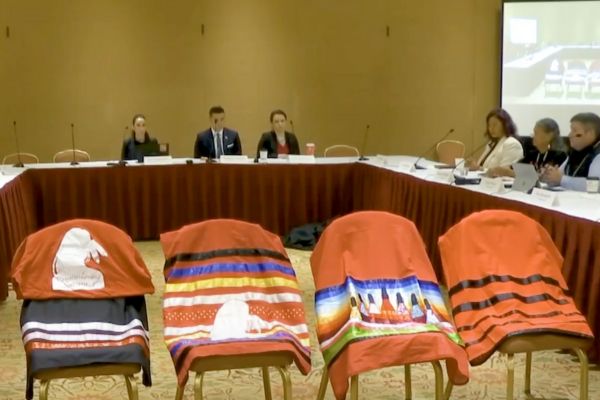
- Details
- By Elyse Wild
ALBUQUERQUE, N.M. – The U.S. Department of Justice announced Wednesday it will be dedicating new resources to address the Missing or Murdered Indigenous Persons (MMIP) crisis.
Under a new Missing or Murdered Indigenous Persons (MMIP) Regional Outreach Program, the DOJ will permanently place ten attorneys and coordinators in five regions across the United States to assist in the investigation of unsolved MMIP cases and related crimes while promoting collaboration among federal, Tribal, local and state law enforcement as well as non-governmental stakeholders. The five regions include the Northwest, Southwest, Great Plains, Great Lakes, and Southeast Regions, and MMIP personnel will be located within United States Attorneys’ offices in the Districts of Alaska, Arizona, Eastern Washington, Minnesota, New Mexico, Northern Oklahoma, Oregon, South Dakota, and Western Michigan.
Native American communities experience high rates of assaults, abduction and murder. According to data from the Center for Disease Control and Prevention, Native women living on reservations are murdered at a rate ten times higher than the national average. Layered jurisdiction, lack of collaboration between law enforcement bodies and systemic apathy have led to thousands of unsolved cases in Indian Country. While there is no comprehensive data on MMIP, the Bureau of Indian Affairs estimates there are 4,200 unsolved MMIP cases.
U.S. Attorney General Merrick B. Garland acknowledged that tribal communities have been left reeling from the crisis.
“This new program mobilizes the Justice Department’s resources to combat the crisis of Missing or Murdered Indigenous Persons, which has shattered the lives of victims, their families, and entire Tribal communities,” Garland said in a statement. “The Justice Department will continue to accelerate our efforts, in partnership with Tribes, to keep their communities safe and pursue justice for American Indian and Alaska Native families.”
The new regional outreach program was announced during Wednesday’s Not Invisible Hearing Commission Hearing in Albuquerque, N.M., where Tribal officials, Native leaders, law enforcement and government officials convened for panel discussions and to witness testimony from Native American community members impacted by the MMIP crisis.
The hearing opened with a prayer by Gil Vigil, an enrolled member of the Tesuque Pueblo and executive director of Eight Northern Pueblos Council. Commission members were seated around four chairs, each chair donning a red skirt in honor of those who have been murdered or are missing. Following the prayer, the commission held a moment of silence members spoke the names of victims, including Daisy Mae Heath of the Yakama Nation, who went missing in 1987 and whose remains were identified in 2008.
The hearing is one of seven held this year across Indian Country as the 37-person Not Invisible Act Committee develops recommendations on improving intergovernmental collaboration on violent crimes in Indian Country and providing resources for survivors and victims’ families. Information gathered at the hearings will be part of the commission’s final report to Secretary Haaland, Attorney General Merrick Garland and Congress in October.
At Wednesday’s hearing, New Mexico State Senator Linda Lopez underscored the United States’ trust responsibility to tribal nations and the need to put federal resources behind the MMIP crisis.
“The federal legislatures need to own up to the duty between the federal government and our reservations and Indian Country to make sure we are providing funding to adequately do the work for those who are missing,” Lopez said.
Elizabeth Hidalgo Reese, a member of Nambé Pueblo and senior policy advisor for Native American affairs at the White House, acknowledged
the victims and families present at the hearing and how critical their testimony is to create solutions to the crisis.
“These hearings are so important,” Hidalgo Reese said. “Neglect and invisibility are too often the cause or enable violence in our communities ... we need to understand this problem from every angle. We need to explore every possible solution, so we need to hear from all of you.
More Stories Like This
Native News Weekly (August 25, 2024): D.C. BriefsNavajo Nation Mourns the Passing of Former Vice President Rex Lee Jim
Deb Haaland Earns Endorsement From Communications Workers of America Local 7076
University Soccer Standout Leads by Example
Two Native Americans Named to Democratic Congressional Campaign Committee's“Red to Blue” Program
Help us defend tribal sovereignty.
At Native News Online, our mission is rooted in telling the stories that strengthen sovereignty and uplift Indigenous voices — not just at year’s end, but every single day.
Because of your generosity last year, we were able to keep our reporters on the ground in tribal communities, at national gatherings and in the halls of Congress — covering the issues that matter most to Indian Country: sovereignty, culture, education, health and economic opportunity.
That support sustained us through a tough year in 2025. Now, as we look to the year ahead, we need your help right now to ensure warrior journalism remains strong — reporting that defends tribal sovereignty, amplifies Native truth, and holds power accountable.
 The stakes couldn't be higher. Your support keeps Native voices heard, Native stories told and Native sovereignty defended.
The stakes couldn't be higher. Your support keeps Native voices heard, Native stories told and Native sovereignty defended.
Stand with Warrior Journalism today.
Levi Rickert (Potawatomi), Editor & Publisher


